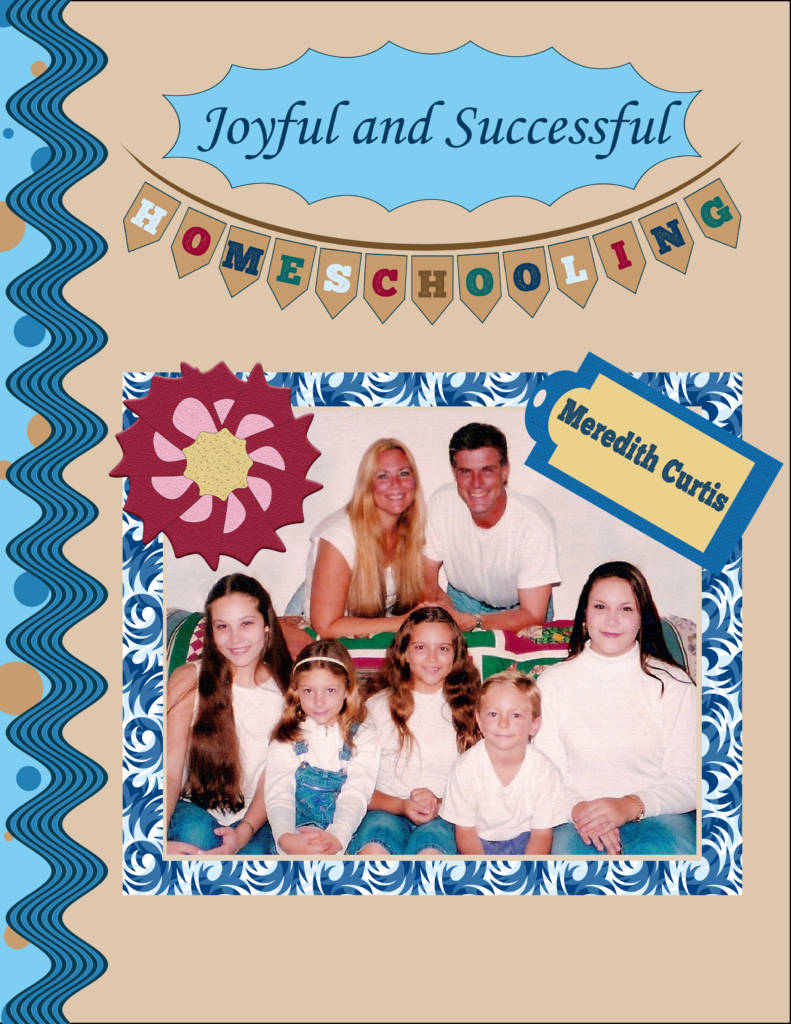I sat down with another homeschool mom who confessed her kids hadn’t gotten any schoolwork done the whole year (it was November), the house was a constant mess, and she had all these homeschool dreams, but she was giving up.
She needed help!
We can be led by the moment or derailed by the interruptions of our day. It is hard to direct children who want to do their own thing when you are up all night with a sick baby.
Yet, you look at rigid moms who run a tight ship and you think, “That’s not me.”
Or you were on a rigid schedule at one time in your life and now it is IMPOSSIBLE to stay on a schedule. What can you do?
I have help for everyone! A schedule is your servant, not your master, but schedule is a wonderful tool to help you accomplish your homeschooling goals.
Change the Template
Instead of thinking in hours (from 9 a.m. to 11 a.m.), I have learned to think in blocks of time (between breakfast and lunch). It makes more sense as a mom.
Our days have these blocks of time:
- Before Breakfast
- Breakfast (short for some and long for others)
- Between Breakfast and Lunch
- Lunch
- Between Lunch and Dinner
- Dinner
- After Dinner
- Bedtime Ritual.
These things happened in your house every day. Your bedtime ritual might be a nightmareish showdown, but you have one. Breakfast may be on the run dashing to homeschool co-op, but your kids eat it.

Reality Check!
When we don’t have a plan, things fall into chaos.
When we don’t give direction to our children for the day, they slide into neutral, the easiest thing for their brains—TV, videos, internet, napping, eating.
If I am led by my “heart” I will eat candy and watch old TV shows or talk on the phone all day. Poof! The day is gone.
Psalm 90 verse 12 addresses this: So teach us to number our days, That we may present to You a heart of wisdom.
One day, I sat down with a calculator and figured out how many days I had to homeschool my children. The numbers seemed big until you compare that with the rest of my life.
Our season with our children is short!
Will we prepare them to live successful, productive, joyful lives? Our mission requires us to be focused and disciplined.
A plan is required.
What Really Matters
I like to step back and thing about what really matters to me.
- What do I want to run my days and weeks to look like?
- What do I want to accomplish each week (chores, school work, free time, reading time)?
- I want Jesus to be Lord of my homeschool. But what does that look like?
Ask yourself questions like these so you can determine what you want the days/weeks to look like. Be practical and realistic, not idealistic here.
Then examine yourself, your husband, and your children. What factors will play into this plan?
When my children were little, I discovered that we all worked best in the morning.
In addition, my parents raised me to work first, play second. So, I learned at an early age to “suck it up” and get the job done so you can relax and play. I’m grateful—it is probably the only reason I get anything done when there is stress or sorrow in my life. I wanted to get work done and then leave room for free time/play at the end. Other moms prepare work/break/work/break.
I wanted to spend time with the Lord in the morning so my children learned at an early age to pull a stool over to the pantry and reach up for the cereal to fix their own breakfast. My own mother did and my daughter does prepare hot breakfasts every morning: eggs, pancakes, waffles, etc. But, I wasn’t able to pull it off and that’s okay.
I came up with this for our home school
- Intense schoolwork in the mornings
- Fridays would be field trip or fun day (we did this until high school when the work load was heavier)
- Church and Bible study every week
- Mike would do Bible time each morning with them
- 5 Things before Breakfast
- Most chores would be after schoolwork or on Saturday
- If children wanted a break day for whatever reason, they would have to work ahead (not catch up later) to be able to go
Now everyone will come up with their own values and priorities. What’s important is that you know what truly matters to you because if you don’t take that into account, it will derail your plans.
Planning Blocks of Time

Think about when your family members get up and when you eat breakfast on average. How much time is there?
Think about eating breakfast. Is there time to read the Bible during breakfast and pray together afterward? Will that work or not?
Think about mornings. About how much time do you normally have between breakfast and lunch? Remember the real not ideal.
Lunch time. Does everyone talk? Is everyone on their phone? Can the phones be turned in and read poetry together or listen to audios during lunch? Or does everyone need that time to just eat and visit?
Afternoons. How long is there normally between lunch and dinner? When thinking about time, exclude time you need to prepare dinner?
After dinner. We are unable to commit to any schoolwork or chores after dinner, but some families are just revving up. What is your family like after dinner?
Now plug in subjects, chores, reading time, play time, screen time, and free time into the schedule.
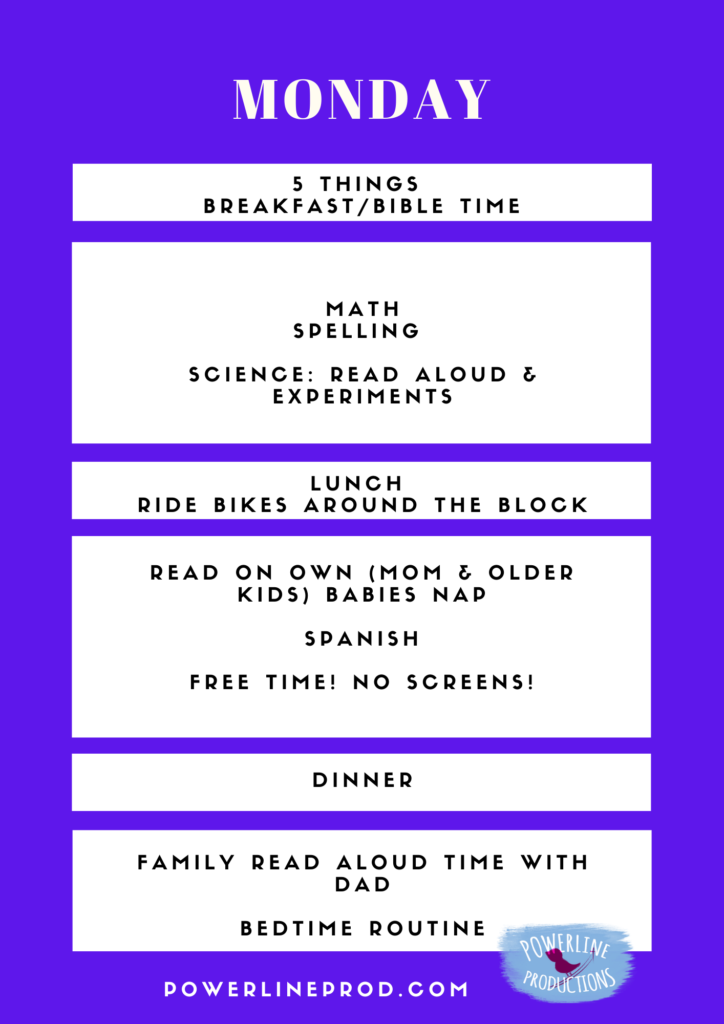
Example from out house:
- For us, we’ve always done math first thing five days a week. It’s like a good brain stretch.
- My children do their “5 things” (brush teeth/hair; get dressed; make bed; straighten room; personal Quiet Time) before breakfast.
- We like to read quietly after lunch while babies nap.
- We do history and science all together, but everyone does spelling and grammar on their own.
Here is a sample weekly (M-F) schedule using Flexible Scheduling.
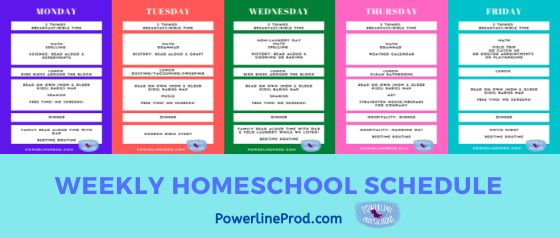
Reality Check!
One thing I had to constantly remind myself was that to HOMEschool, I had to be at home quite a bit. I often overscheduled. Then when I made a schedule, I realized that we might be able to go do a ton of things, but that left little time left for schoolwork. Once we leave the house, we are just not able to get back into the groove of school at our house. Other families are different. With that in mind, I always scheduled lessons and activities as late in the day as possible.
Just because you have a plan for each day doesn’t mean each day will go according to schedule. You will have interruptions, accidents, spills, and people dropping in.
There are exceptions, but when most people drop in during school hours, I say, “Children, let’s take a 5 minute break to visit with (???)” and then after a quick visit I say, “We have to get back to school time, but you are welcome to listen in.”
I have Friday afternoon set up in my weekly schedule, but what if the doctor, or dentist, can’t fit me in on a Friday? That’s when I move blocks of time around.
Moving Blocks of Time
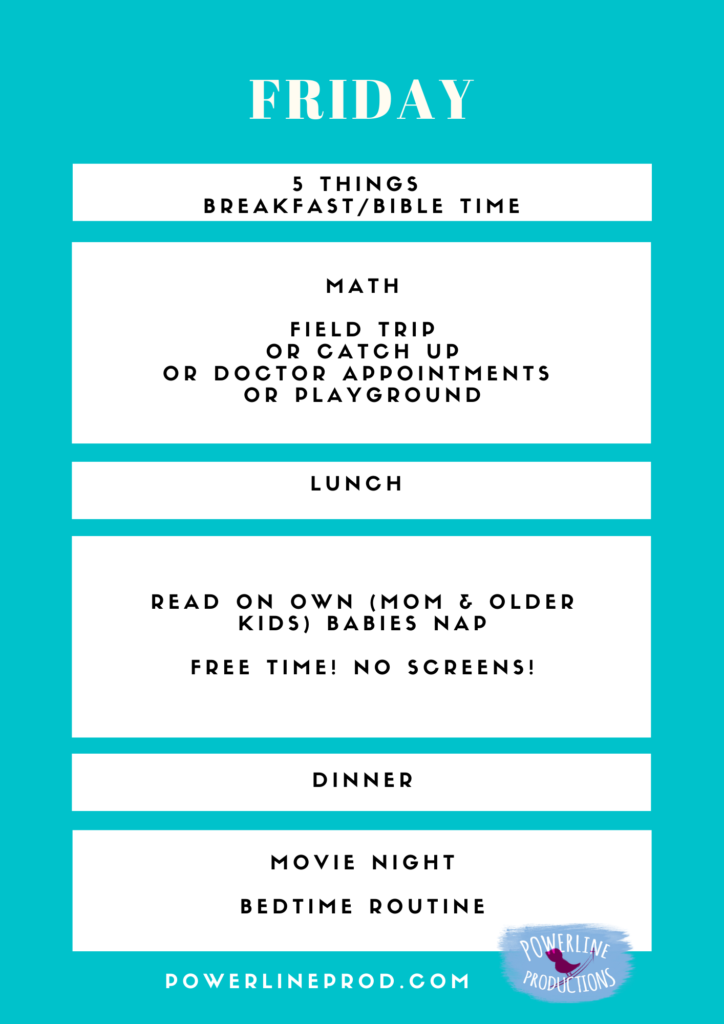
My doctor can only see me on Tuesday afternoon, but I’ve schedule doctor appointments on Friday. I can switch Friday with Tuesday—switch the whole day’s schedule or I can switch Friday morning with Tuesday afternoon.
That’s why I always schedule free time in. Then when things come up, I can move my schedule around.
Reality Check!
As my teens moved into high school, I discovered that they would have to log a lot more hours studying, writing, and reading. This meant schedules were more tricky and each one found their own rhythm.
When the kids were older, there was a family schedule and then each teen had a schedule. I helped them make it, but really they made it. We would make a schedule at the beginning of the year and then tweak it after 3-4 weeks.
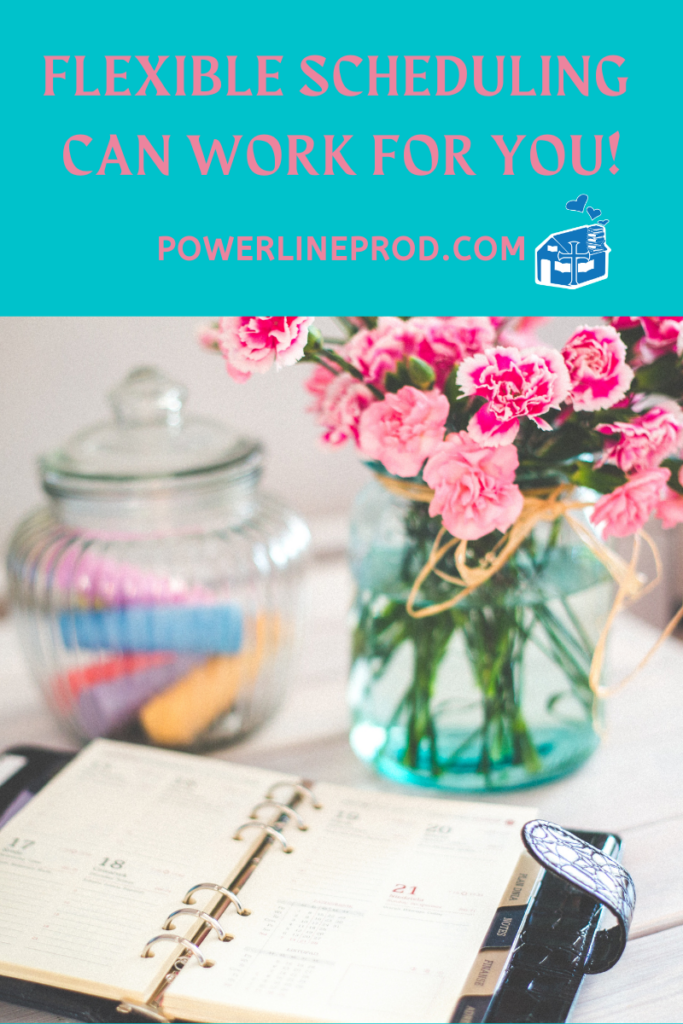
Tweaking Schedules
It is super important to be realistic when you make a schedule. If not, the schedule is just a project, not a tool.
I cannot tell you how many schedules I have made that were unrealistic. No, I just can’t seem to get up at 5 a.m. for the spin class at the Y. No, I can’t get math work check in 20 minutes per day. No, I can’t fit ballet lessons, piano lessons, and tennis lessons. One or things will have to go.
Posting Schedules
I decorated the schedules to make them attractive for my kids!
I would always give each child a copy of the family schedule and their own personal one. Next, I hung all the schedules on the homeschool cabinet door. It made it easy to remember what they were working on. High school schedules were super complicated as they added co-op classes, sports, and ministry at church.
You can see some of our schedules below.
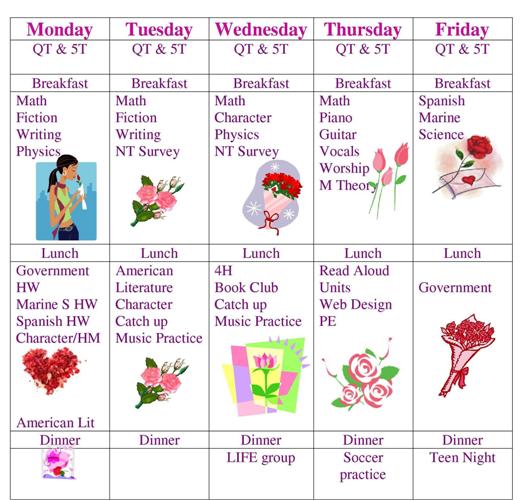
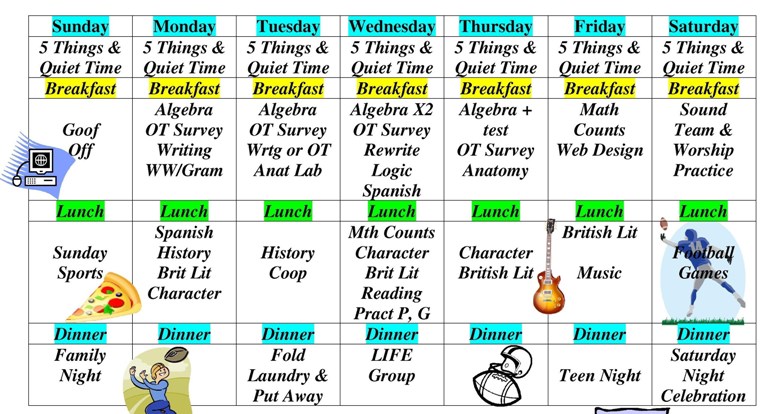
Until next time, Happy Homeschooling!
Warmly,
Meredith Curtis
